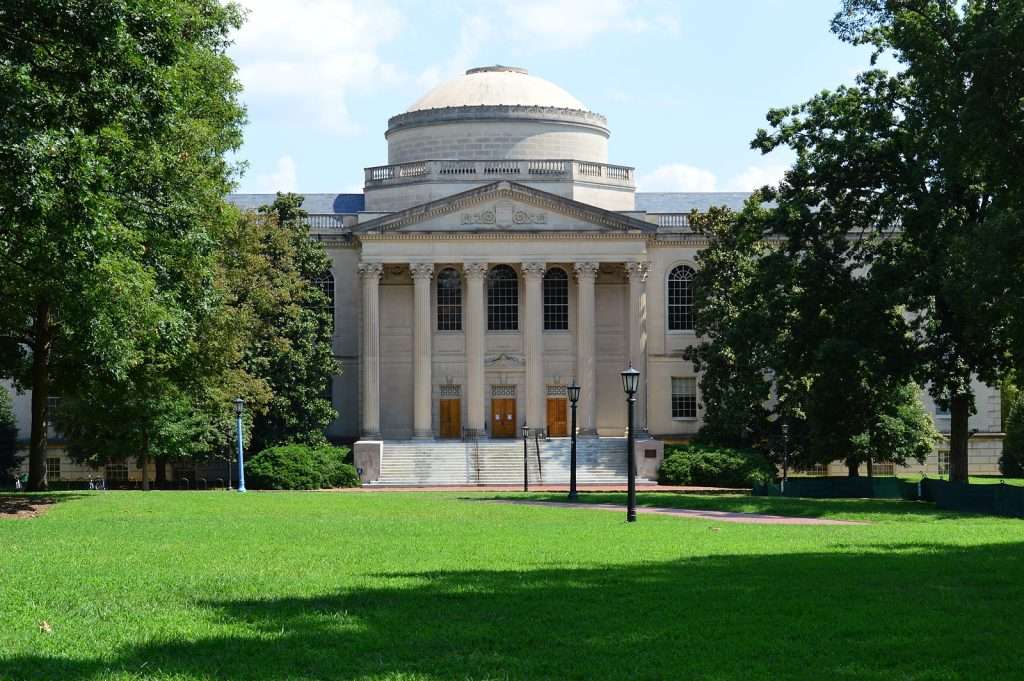College Intel
University of North Carolina Admissions

Three universities lay claim to the status of first public university established in the United States, but the University of North Carolina at Chapel Hill is the only contender that granted degrees as a public institution in the eighteenth century. Chartered by the North Carolina General Assembly in 1789, UNC is the gold standard for elite public education. The flagship location of the North Carolina University system boasts a library system famous for its comprehensive historical archives on the state of North Carolina, an athletics program with 50 national championships in NCAA Division I, and a historic campus located in an animated college town.
UNC alumni (who are known as Tar Heels due to North Carolina’s history of producing tar and pitch) form an immense, enthusiastic network. Tar Heels form close connections while rooting for the downfall of Duke (located just 8 miles from campus) and UVA (whose 132 year-old rivalry with UNC has been termed the “South’s Oldest Rivalry”), while taking part in a spirited debate as representatives of the Dialectic and Philanthropic Societies, and while being taught by such faculty as Nobel Prize-winning physiologist Oliver Smithies and Nobel Prize-winning chemist Aziz Sancar. Former President James Polk is a Tar Heel, as is actor Andy Griffith and Michael Jordan (a man who needs no introduction!).
UNC’s undergraduate student body of approximately 20,000 students is split between eleven schools and programs. The “IDEAs in Action General Education Curriculum” shapes undergraduate coursework beyond the requirements of the 70 different majors offered at UNC. This core curriculum requires first-year classes in data literacy, English composition, and a Freshman seminar. As students progress through their bachelor’s, nine “Focus Capacities” classes and “Disciplinary Distribution” classes covering “humanities and fine arts,” “mathematics and natural sciences,” and “social and behavioral sciences” are required.
After operating for decades as North Carolina’s first and foremost public university, UNC was shuttered during the Reconstruction period after the Civil War. However, by 1875 Chapel Hill was back in business. During the 20th Century, the university would become a major site of the Civil Rights Movement. Protests were organized by students as a part of the Sit-in movement for desegregation and as part of free speech efforts to prevent the censorship of activist speakers.
Today, UNC receives over $500 million in annual funding from the National Institutes of Health, is a highly competitive member of the esteemed Atlantic Coast Conference, administers the prestigious Morehead Cain merit scholarship program (the first of its kind in the United States), and acts as the centerpiece of one of America’s most idyllic college towns. For those who might be curious, Chapel Hill is often thought of as a blue bubble in a sea of red because of its liberal-leaning population amidst a more conservative state.
Student’s make the most of their education through extensive extracurricular engagement. Whether they write for the award-winning student newspaper, The Daily Tar Heel, act with the regional theater troupe, the Playmakers Repertory Company, or socialize in their fraternities and sororities (which account for 1-in-5 students), Chapel Hill’s undergrads certainly keep busy.
North Carolina law stipulates that 80% of the student body at UNC must be drawn from applicants within the state. 56,427 applied for admission to the Class of 2027, but only 17% were granted admission — 43.1% for North Carolina applicants and 8.2% for out-of-state applicants. The Morehead-Cain scholarship program, which provides full tuition and summer research funding, maintained a 3% acceptance rate.
The UNC Undergraduate Admissions Office describes the most competitive applicants as those who “have a wide range of interests and excel in many types of activities — or focus on one or two things.” At Ivy Coach, we encourage all of our students to take this second approach. By demonstrating that you possess a specialized talent, your chances of joining the next generation of Tar Heels will greatly improve!
TOWARD THE CONQUEST OF ADMISSION
If you’re interested in Ivy Coach’s college counseling, fill out our complimentary consultation form and we’ll be in touch.
Get Started